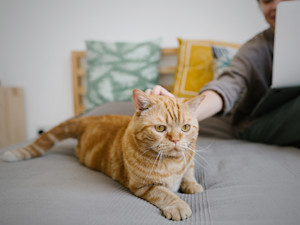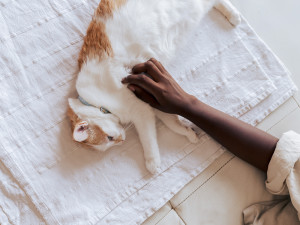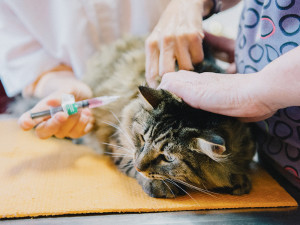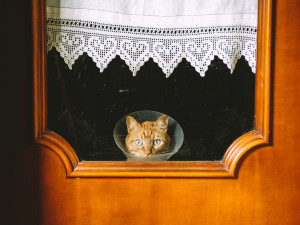What’s the Deal with FIV in Cats?
The most common questions about feline immunodeficiency virus, answered. Good news: most cats live long, happy lives.
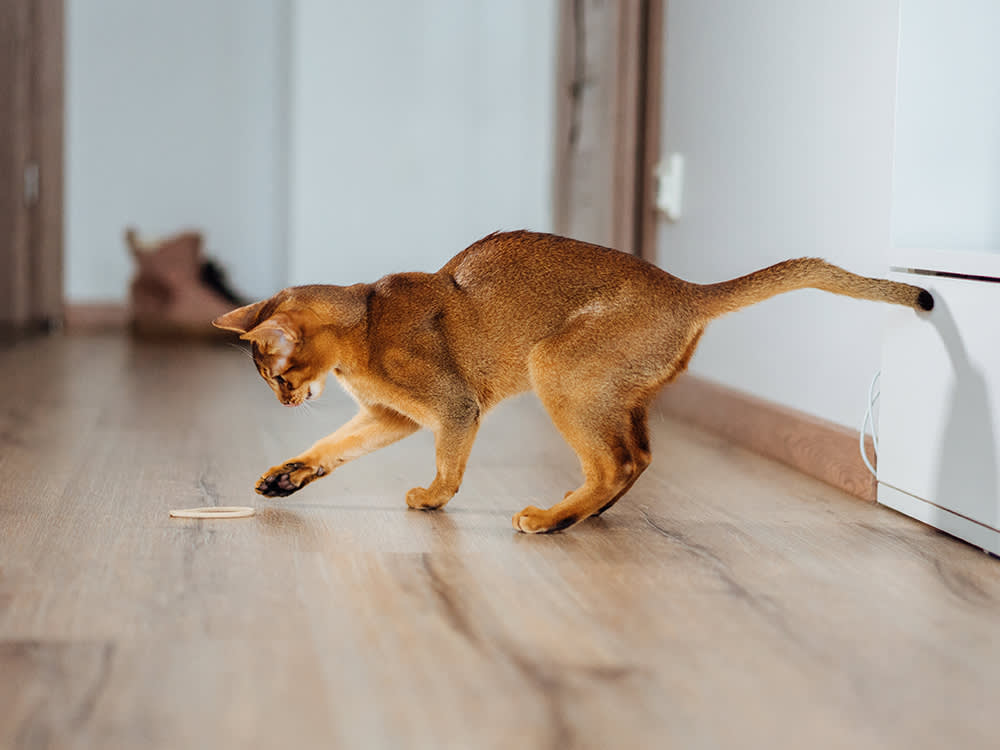
Share Article
Perhaps you’ve heard that feline immunodeficiency virus can make cats feel sick. It’s true that the autoimmune disease can cause symptoms like fever, poor appetite, weight loss, lackluster coat, diarrhea, dental disease and slow-to-heal wounds, but some cats experience no symptoms at all.
“Most cats typically live many, many years without any negative impacts,” says Dr. Julie Levy, DVM, PhD, DACVIM, DABVP, and professor of Shelter Medicine Education at the University of Florida. The risks of a cat contracting HIV are low: Fewer than 5 percent of cats in North America have the virus and the biggest risk is to outdoor, unaltered male tomcats that transmit the infection via bite wounds, so your sweet, spayed, indoor-only cat faces minimal risk. And the virus, once thought to be a reason to euthanize, is now considered a chronic disease.
How is FIV spread?
FIV is spread through bite wounds. It can’t be spread among cats that groom each other or share litter boxes, food bowls or beds; the risk of transmitting the virus through sexual contact is also low — but that doesn’t mean it’s a good idea to let FIV positive cats breed. There is a chance that an infected mother could pass the virus to her kittens. “We used to say, very rigidly, that cats with FIV should be segregated from un-infected cats,” Dr. Levy says. “There’s been research to show that if cats don’t fight, they are very unlikely to transmit the virus.”
FIV can’t be transmitted to other pets or people and, even among altered cats that live together in harmony, the risks of transmitting the virus are so low that the American Association of Feline Practitioners changed its position on adopting out FIV positive cats to multi-cat households. Now, the organization — and many, many shelter and rescue groups — encourage the adoption of FIV-positive cats, according to Dr. Levy.

How will I know if my cat has FIV?
Infected cats may not show any signs of the virus. In the earliest stage, called the acute phase, an infected cat may have symptoms like swollen lymph nodes, fever, and loss of appetite but the signs are often so subtle that owners often miss them. The next phase is the asymptomatic phase and, as its name suggests, it’s a time when infected cats show no obvious signs of illness. This phase can last for years and some FIV positive cats never develop symptoms of severe disease at all.
Only cats that enter the progressive phase show obvious signs of illness. At this stage, FIV positive cats may be so immunocompromised that they end up with secondary infections like upper respiratory infections, dental disease, or urinary tract infections. No one wants to see their cat feeling ill but, Dr. Levy stresses, “FIV is not a death sentence. Most FIV positive cats live healthy lives for many years.”
Is FIV preventable?
In 2002, an FIV vaccine was introduced in the United States. The vaccine contained strains of the inactivated virus and while it did offer limited protection it also had one significant drawback. “The tests for FIV are antibody tests and when you get vaccinated, you make antibodies,” Dr. Levy explains. “Cats who were vaccinated tested positive for FIV.” Since the risk of transmission in altered indoor cats was so low, many veterinarians didn’t recommend the vaccine and Dr. Levy suspects that low sales also led to the FIV vaccine being discontinued.
While there is no vaccination, there are other ways to protect your pets. Dr. Levy points to spaying and neutering, which have been shown to limit aggression, as the most important thing you can do to reduce the risk your cat will develop FIV. Keeping cats indoors — either as solo pets or with other well-socialized cats — also drastically decreases the risk of FIV.
Should you adopt a cat with FIV?
FIV positive cats are adoptable. In fact, cats with FIV have the same lifespan as FIV-negative cats and can even live with other healthy, non-aggressive cats.
The virus is spread via blood, which means that a deep bite or scratch that comes from a serious fight can transmit FIV. In multi-cat households, it’s important to maintain a balanced social structure — and to make sure that all cats are spayed or neutered to reduce aggression, especially between tom cats, and to prevent the spread of FIV from mother cats to kittens.
As solo pets, FIV positive cats are just like other feline friends: They need balanced diets, exercise, mental stimulation, and regular vet checks to maintain good health. FIV cannot be transmitted to people, so there is zero risk to adopters who welcome FIV-positive cats into their homes.
What are the treatment options?
There is no cure for FIV and, since your cat may never show symptoms of illness, treatment may not even be necessary. But prevention is essential: In addition to spaying and neutering, keeping your cat indoors, regular veterinary checkups, routine dental care, and a healthy diet can help reduce the risk that an FIV positive cat will develop a secondary infection.

Jodi Helmer
Jodi Helmer is a North Carolina-based freelance writer who shares her home with an embarrassing number of rescue dogs and relies on four feral cats to patrol the barn. When she isn’t refilling food and water dishes, Jodi writes about animals for Scientific American, Sierra, WebMD, AKC Family Dog, Living the Country Life, and Out Here.
